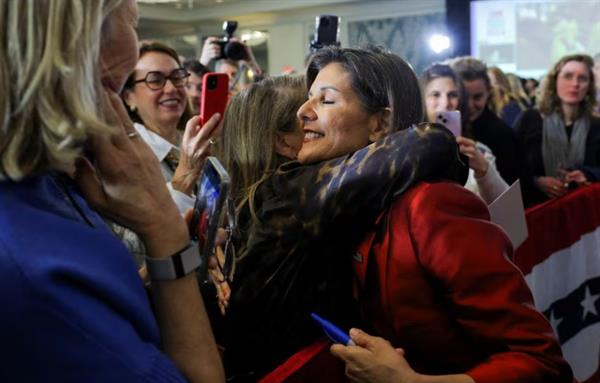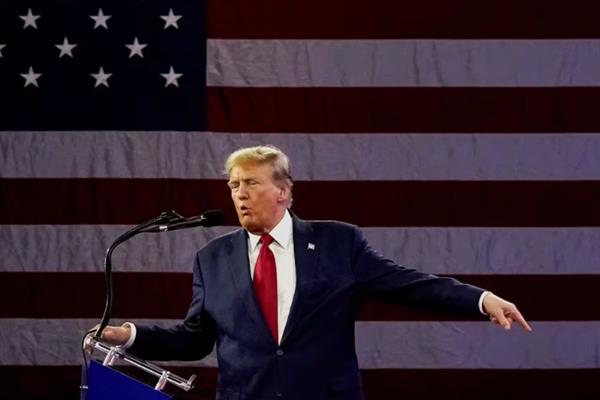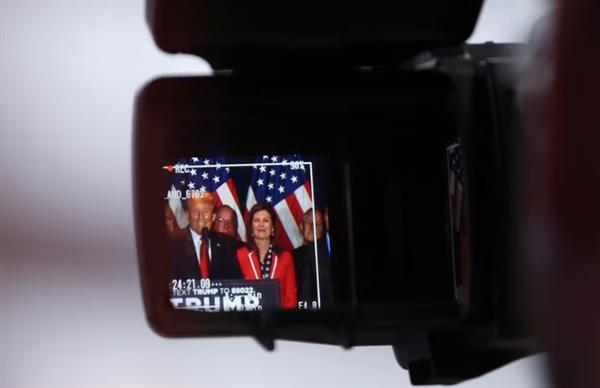How Trump defeated Nikki Haley in her home state of South Carolina
Donald Trump strategically secured endorsements to defeat Nikki Haley in the South Carolina primary, a critical win in the Republican race.
Donald Trump's significant primary win on Saturday over Nikki Haley in her home state of South Carolina was the outcome of a strategic and relentless campaign aimed at neutralizing her as a contender, according to aides and individuals close to both campaigns. Despite already securing several primary victories, winning South Carolina was pivotal for Trump, as it is a crucial early Republican primary state that often indicates the party's eventual nominee. Unlike in 2016, Trump faced a rival who had served two terms as the state's governor and still enjoyed local popularity.

The strategy involved politically isolating Haley by swiftly securing endorsements from numerous state officials to publicly demonstrate that she had no viable path to the presidency through South Carolina, according to aides familiar with the Trump campaign's plan. Although Trump's victory on Saturday was not a landslide, he still defeated Haley by a comfortable margin of 20 percentage points on her home turf.
"We were up against a two-term governor, so it was crucial to demonstrate strength. We needed endorsements to dissuade donors and voters from considering Nikki," a senior Trump campaign adviser told Reuters on the condition of anonymity. Chris LaCivita, a co-manager of Trump's campaign, emphasized the crucial role played by a series of high-profile endorsements in quashing the competition in the state. Another key factor in Trump's success was the meticulous collection and utilization of data on the thousands of voters who attended his rallies.

The real work, according to LaCivita, began after the rallies, with campaign staff based in a nondescript office park in North Charleston working tirelessly for months to use voter data to engage with potential voters regularly. This approach, similar to the one used to win in Iowa and New Hampshire, was instrumental in Trump's victory in South Carolina.
As recently as December, Haley had publicly stated that South Carolina was where she would defeat Trump and turn the tide of the nominating contest. However, by January 24, Trump had secured endorsements from 158 current and former South Carolina Republican officials, including lawmakers, mayors, and sheriffs, while Haley had only received endorsements from one U.S. House member, 11 current state lawmakers, and two mayors.
"The endorsements (for Trump) are significant. They are quite embarrassing in their quantity for Nikki Haley," the Trump campaign adviser remarked. "When you have local officials like the police chief or a city council member advocating for President Trump at a barbecue or a local meeting, it amplifies our ground game and grassroots efforts," the adviser added.
Leading the effort to secure endorsements were Governor Henry McMaster, Ed McMullen (Trump's former ambassador to Switzerland and a veteran of South Carolina politics), and Justin Evans (a state operative who managed Haley's first political campaign in 2010). Murrell Smith, the influential speaker of the South Carolina House of Representatives who endorsed Trump in August 2023, also played a crucial role in securing endorsements within the State House, as did Lieutenant Governor Pamela Evette.
McMullen stated that he and other Trump allies had begun outlining a plan to ensure the former president's dominance in the state as early as June 2022, months before Trump officially announced his candidacy in November. Trump's surrogates in South Carolina began contacting every state House and Senate member in May 2023, inviting lawmakers who were hesitant to endorse Trump to personal meetings with him when he visited the state.
Despite the overwhelming support for Trump, Haley persisted with her campaign, relying on some 1,700 volunteers across the state, and maintaining an aggressive campaign schedule in South Carolina in recent weeks. Her campaign spokesperson, Olivia Perez-Cubas, emphasized Haley's track record as an outsider and conservative candidate, highlighting her accomplishments as governor.

While seeking endorsements is common in U.S. presidential politics, securing such a large number played a significant role in South Carolina due to Haley's ties to the state. Trump employed similar tactics to pressure Florida Governor Ron DeSantis out of the race, emphasizing his substantial advantage in endorsements in Florida to portray himself as the clear frontrunner. DeSantis ended his campaign in January.
A particularly coveted endorsement was that of Tim Scott, one of South Carolina's U.S. senators and a former presidential rival to Trump who dropped out of the race in November. Scott had been appointed to his Senate seat by Haley when she was governor, making his endorsement over the woman who had appointed him a notable achievement for Trump.
Despite Scott's endorsement of Trump, Haley remained undeterred, continuing her campaign with donor support, even as defeat to Trump in her home state seemed inevitable. Trump and his allies hoped that a loss in South Carolina would compel Haley to withdraw from the race, but she declared on Saturday night that she was not giving up and would continue her presidential campaign.